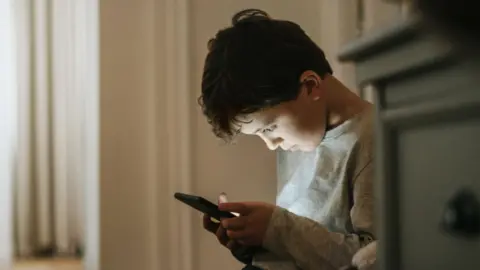The issue of children’s safety in the digital world has come sharply into focus as the government contemplates stringent regulations on social media use among minors. High-profile conversations surrounding this topic have led to the suggestion that the government will implement significant measures to mitigate the risks posed by social media platforms to young users.
Current proposals under discussion include instituting a two-hour limit on the usage of individual social media applications, as well as establishing a curfew that would restrict access to these platforms post 10:00 PM. This angle was first revealed through reporting by the Sunday People and the Mirror, indicating a growing recognition of the need for legislative action to counter the potential dangers of online content for children.
In an appearance on the BBC’s program “Sunday with Laura Kuenssberg,” Technology Secretary Peter Kyle acknowledged the “addictive nature of some of the apps and smartphones.” His acknowledgment of this beguiling quality that many platforms possess raises an essential alarm among parents and guardians, who express ongoing concerns about the time children spend immersed in online environments.
However, despite this forward-thinking stance by some government officials, advocates for online safety are voicing considerable frustration. Ian Russell, a key campaigner whose personal loss—the tragic passing of his daughter Molly at the age of 14—was linked to harmful content on social media, has chastised the government for its sluggishness in enacting protective measures. According to Russell, each day that the implementation of more robust online safety laws is delayed translates to more potentially preventable tragedies among the youth, exacerbated by lax regulations and the inaction of major tech companies.
Echoing these sentiments, Russell emphasized the need for “stronger and more effective” legislation. He argued that merely introducing shallow measures would not suffice to address the fundamental challenges posed by products and business models that prioritize user engagement at the expense of safety. His hope is that Prime Minister’s decisive action can curb the wave of online harm that children face daily, asserting that temporary fixes are inadequate.
Minister Kyle further detailed the situation on the BBC, indicating that legislation passed during the tenure of the Republican government in 2023 remained in limbo, awaiting activation. He noted the need for enforceable measures against online platforms that fail to remove illegal content promptly. By July of that year, he indicated, platforms would be mandated to provide age-appropriate material, or risk facing criminal sanctions.
Kyle’s future vision for the government’s role includes an active engagement in defining “a healthy online life for children,” focusing on dismantling obstacles that impede this goal. His previous comments have highlighted the flawed nature of existing laws on internet safety, which he described as “very uneven” and “unsatisfactory,” while admitting his frustration with the state of affairs.
Despite growing public concern and advocacy for increased action, a Whitehall source clarified that there are currently no intentions to repeal the existing Online Safety Act. As community advocates fight for change, they remain hopeful that pointed media coverage and ongoing discussions will help influence the government’s policy decisions—particularly in creating a safer digital landscape for children.
The rapid pace of technological advancement, coupled with rising awareness of its potential consequences, underscores the urgency of this discourse. As the government navigates the complexities of online regulation, the balance between innovation and child safety remains a paramount challenge in the contemporary landscape. Effective legislative measures may not only protect the young but also redefine how social media platforms operate, emphasizing responsibility over mere user engagement.



